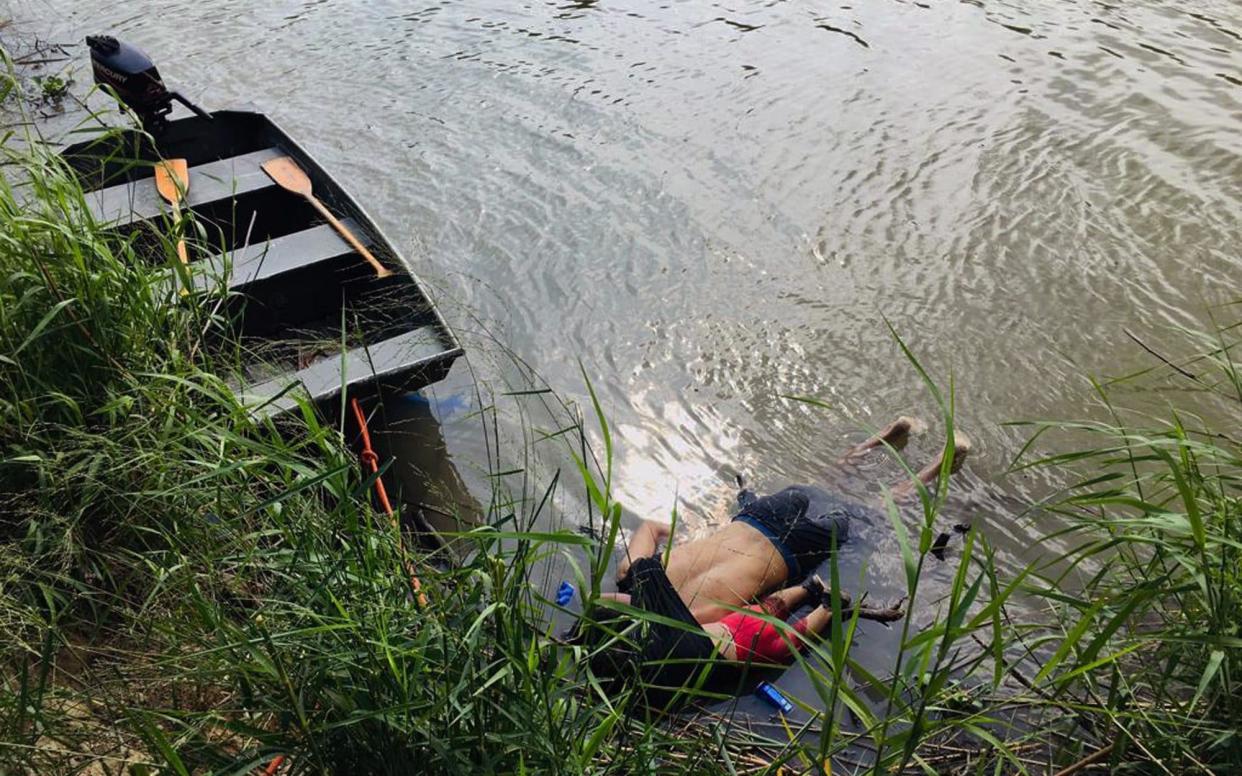How lifeless body of toddler came to be slumped by dead father in river on US-Mexico border

The city of Matamoros sits tantalisingly close to the US border, with Brownville, Texas in clear view over the Gateway International Bridge.
It was here that the Salvadoran refugee Oscar Alberto Martinez Ramirez, 25, and his 23-month-old daughter, Valeria, arrived to claim asylum in the United States two months ago.
But on Monday, their drowned bodies were found locked in a final embrace, Valeria tangled up in her father’s black t-shirt, on the banks of the Rio Grande river, which runs under the bridge.
The shocking photograph of their corpses, now broadcast around the world, illustrates the plight of migrants and refugees who are making increasingly perilous attempts to reach the United States.
But the story of what drove them to attempt the fatal river crossing also raises questions about the Trump administration’s border regime, which is turning refugees away from the border or cramming them into purgatorial reception centres.
From the scorching Sonoran Desert to the fast-moving Rio Grande, the 2,000-mile border has long been a deadly crossing between ports of entry. A total of 283 migrant deaths were recorded last year; the toll so far this year has already reached 170.

According to local media reports, Mr Ramirez had grown frustrated with the processing system at the Puerta México migrant camp, and felt there was little hope of his request for asylum ever being processed.
The US government claims the applications are delayed as it does not have the capacity to process them, with families of asylum seekers sleeping in makeshift camps where they risk being split up by border guards.
Tania Vanessa Avalos, Mr Ramirez’s wife, says the family had been kept for two months in the Puerta México camp, waiting for an appointment to discuss their asylum claim.
They came from El Salvador, where decades of civil war and gang violence has transformed the Central American country into one of the most dangerous in the world.
Thousands of Salvadorans have joined migrant caravans headed towards the US border in search of refuge, but the images of them walking en masse towards America have been portrayed by President Donald Trump as an “invasion.”
Mr Martinez reportedly worked at Papa Johns in El Salvador, according to relatives, where he earned $350 (£275) per month, while his wife had given up her job at a Chinese restaurant to look after their daughter.
“They went for the American dream,” Mr Ramierz's sister, Wendy Joanna Martínez de Romero, told the New York Times.

Other Mexican media reports say she begged the family not to leave, but they had been completely seduced by the hope of a prosperous life in America.
The family lived with Mr Ramirez’s mother, Rosa, in Altavista, sprawling complex of small, concrete houses east of San Salvador.
The area is under the control of gangs, but in an interview with the New York Times, Ms Ramirez said it was economic hardship of living on just $10 (£7) per day, rather than violence, which pushed her son and his family to flee El Salvador.
Nevertheless, Mr Ramirez managed to obtain a political asylum visa from the Mexican government during the long journey to the Mexican border, which would have strengthened his family’s case when they presented themselves to the US authorities.
Instead, the family was left in limbo for weeks, sweltering in temperatures of up to 45 degrees with little food, which according to local newspaper La Jornada left them in a state of “despair.”
On Sunday, Mr Ramirez and his wife decided they had had enough; they would abandon the asylum process and attempt an illegal crossing into the United States by swimming the Rio Grande river.
At 1.38pm, Mr Ramirez logged into Facebook and informed his sister of the plan.

Three hours later, his mother would receive a phone call from his wife, Tania, screaming incoherently and saying “Oscar died, Oscar and the girl drowned.”
Mr Ramirez took Valeria in his arms and swam across the river, setting her safely on the other side before returning to his wife.
But as he started swimming back, his daughter fell into the water. He turned back and grabbed his daughter, but the pair was then swallowed by a strong current as Valeria’s mother looked on in horror.
She called the authorities, who launched a twelve hour search to retrieve Mr Ramirez and his daughter. As darkness fell they suspended the search due to poor visibility.
Then, the following morning, the search ended in the discovery of the bodies, 500 metres from the spot where the current took hold.
Later, Ms Avalos gave a full account of the ordeal to police punctuated with “tears and screams.”
“When the girl jumped in is when he tried to reach her, but when he tried to grab the girl, he went in further ... and he couldn’t get out,” Ms Avalos told the Associated Press.

“He put her in his shirt, and I imagine he told himself, ‘I’ve come this far’ and decided to go with her.”
Valeria’s right arm was still curled around her father’s neck, as if she had clung to him for safety in her last moments.
Mr Ramirez’s family initially faced immense financial costs of up to $7,500 to repatriate their relatives’ bodies, but the Mexican government has said it will pay for the funeral arrangements.
The case has already drawn comparisons with that of Alan Kurdi, the three-year-old Syrian refugee whose body was photographed off the coast of the Greek island of Kos.
Even so, it remains unclear whether the photograph of Mr Ramirez and his daughter will spur the Trump administration to address criticism of its border policies.

 Yahoo News
Yahoo News 